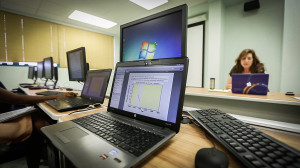Water and Climate Courses in the Caribbean
This article is a modification from a post by the Columbia Center for New Media Teaching and Learning.
In the Caribbean, most states rely on a single source of water for all domestic, agricultural and industrial needs. Variations in rainfall brought on by climate change add to the challenge of managing this limited resource. Furthermore, there are not enough skilled water resource and climate risk managers in the region to develop effective strategies to cope with these problems.

IRI’s Lisa Goddard lectures on climate prediction as part of the Water Education and Climate Program. Barbados, February 2014. F. Fiondella.
The International Research Institute for Climate and Society (IRI), the Columbia Water Center, the Columbia Center for New Media Teaching and Learning and their partners are tackling these problems through an educational initiative that provides professionals in the Caribbean with knowledge and concepts necessary to manage water resources and risk related to climate change and variability. The new Water and Climate Education Program has already developed and run two online courses, and two more are slated for later this year. The courses aim to improve local and regional capacity to manage climate-related risk and will provide participants with the technical expertise to mitigate existing water resource problems and develop sustainable water resource management programs.
The partnership is funded by the U.S. State Department’s Office of Economic Policy and Summit Coordination, as part of the Energy and Climate Partnership of the Americas and is managed by the U.S. Agency for International Development and Higher Education for Development.
The inaugural course, Introduction to Water Sustainability and Climate, was given in January 2014 by Casey Brown, from the Department of Civil and Environmental Engineering at the University of Massachusetts at Amherst. Brown is also an adjunct associate research scientist at Columbia University.
IRI Director Lisa Goddard gave the second course, Climate Information and Predictions from Seasons to Decades, in February 2014. This course was more content intensive than the first, yet participants still diligently did their homework. Dr. Goddard said she “will want to use the content – especially the on-line materials – for other trainings and probably also within Columbia University’s M.A. program in Climate and Society.”
A team of designers, developers and educational technologists from CCNMTL created waceponline.org to host the courses and other resources, including an interactive animation of the hydrologic cycle – the continuous movement of water on, above and below the surface of the Earth.

You must be logged in to post a comment.